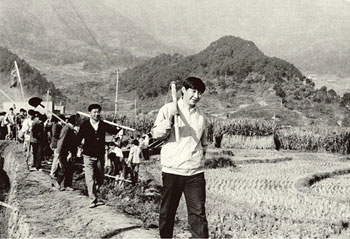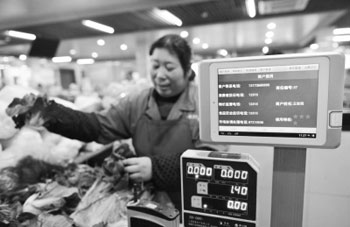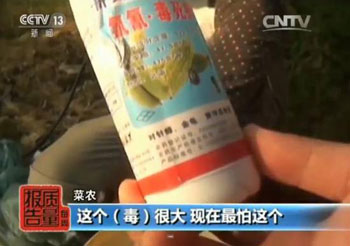Ningde "extremely poor can be rich" to find the right way of development
Original title: writing the catch-up sample of "the Poor can be Rich"
-- how to get rid of Poverty in Ningde City, Fujian Province

In 1988, Xi Jinping, then secretary of the Ningde Prefectural CPC Committee in Fujian Province, took part in labor with the masses when he went to the countryside for research. Issued by Xinhua News Agency (data picture)
"Twenty-five years ago, when I worked in Ningde District, Fujian Province, China, I remembered a saying of the Chinese ancients: 'those who are good for their country, meet people like their parents' beloved children, brothers love their brothers, hear their hunger and cold, feel sorry for their hard work.' To this day, this sentence is still in my heart. "
General Secretary Xi Jinping attended the 2015 High-level Forum on Poverty reduction and Development and delivered a keynote speech on October 16.
"in eastern Fujian, traffic is blocked and there is a shortage of information, so it is dominated by a small-scale peasant economy. The development of commodity economy is more difficult than that of other poor areas. When people talk about eastern Fujian, there are five words: old, young, border, island and poor.
There is no doubt that in the vast sky of the development of the commodity economy, East Fujian, which is very poor at present, is indeed a 'weak bird'. "
-- in September 1988, Xi Jinping, then secretary of the Ningde Prefectural CPC Committee, went to nine counties in eastern Fujian to conduct research. In a casual comment on "how weak birds fly first," he wrote.
Ningde, commonly known as Mindong, is located in the northeast wing of Fujian, across the East China Sea from Taiwan Province.
In theory, located in the open and rich southeast coastal area, Ningde should have nothing to do with isolation and poverty. But in fact, due to the special historical environment and complex natural conditions, it was once one of the poorest areas in China, and some people called it the "economic fault zone" on China's golden coastline.
In the late 1980s, Xi Jinping, then secretary of the Ningde Prefectural CPC Committee, began to work as the center of poverty alleviation and development in eastern Fujian. Over the years, Ningde has always taken poverty eradication and improvement of people's livelihood as the main line of work, one term after another.
Relying on the Mindong spirit of "dripping water wears the stone" and the enterprising consciousness of "weak birds flying first", the painstaking efforts of several generations of Mindong people have obtained a "beautiful" answer to poverty alleviation and development in Ningde-the number of poor people has dropped from 775000 in the mid-1980s to 145000 low-income people, and the poverty level has dropped from 37.8% to 4.26%. In 2014, the per capita disposable income of farmers in the city reached 11302 yuan.
How does dripping water break through the stone of poverty? How did the "weak bird" become full-fledged? Learning from the past, with these questions, the reporter came to Ningde to find the answer to "getting rid of poverty."
The weak bird must first fly to the poor and become rich.
The green foothills of the Tai Mu Mountain and the winding and clear Jiuli River, Chixi Village, Mianxi Town, Fuding City, soon appeared on the side of the unobstructed highway. With a white wall and a neat cottage, it is hard to imagine that this was once a poor mountain village where "one side of the soil and water is difficult to support the other."
"do you remember how poor the village was?" Seeing an old man chatting in the fitness square at the head of the village, the reporter came forward and asked.
"at that time, children had no shoes, and their mother-in-law and wife only had a pair of trousers, which they wore in turn." The old people in the village still remember the hard life more than 20 years ago.
Not only Chixi village, the huge poor hat once covered the whole city of Ningde.
At that time, ordinary people were really poor, living in thatched huts and eating sweet potato rice, and the villagers in many places did not know the RMB of 100 yuan. Ningde is really backward, the mountain road is dangerous, the traffic is not smooth, investors come and go, leaving only four words: water stop, electricity stop, the road is uneven, people can not.
Until the mid-1980s, Ningde was still one of the 18 poverty-stricken areas in the country. Six of the nine counties were identified as state-level poverty-stricken counties, and 52 of the 120 townships were classified as provincial-level poverty-stricken townships. 1/3 people in rural areas of the region live on the line of subsistence.
In 1984, a report entitled "Poor Mountain Village hopes to implement Special policies to Control Poverty and become Rich" showed the poverty situation in Chixi Village to the whole society and aroused the great concern of the CPC Central Committee. The magnificent anti-poverty cause in China opened the curtain, and the story of Ningde people "uprooting the poor and moving the poor nest" also began.
After filling his stomach in the 1980s and taking off the hat of poverty in the 1990s, he has taken a big step towards a well-off society in an all-round way since the new century. Over the past 30 years, what has Ningde relied on to get rid of poverty step by step?
To fill the stomach, Ningde depends on finding the right way to develop. In July 1988, Xi Jinping entered eastern Fujian. In only one month, he traveled to nine counties in eastern Fujian, and on the basis of careful investigation, he proposed to organize a "chorus of economic development", read the "Classic of Mountains and Seas," promote "planting and cultivation," and turn the two wheels of agriculture and industry together. In 1989, the per capita net income of farmers in the region was 554 yuan, an increase of 224 yuan over 1985, with an average annual increase of 13.8 percent, basically solving the problem of food and clothing for the vast majority of poor households.
Taking off the hat, the key to Ningde is to seize the policy opportunity. In the 1990s, the State Council approved East Fujian as an experimental area for comprehensive reform of opening up, promoting development and poverty alleviation. (our reporter Zhong Xin and Li Fei)
Related
- A course of planting techniques and methods on how to grow carrots
- How to plant the latest tulips?
- Is it better to pick tea in the morning or in the afternoon? When is the best time for tea to be picked? what is the third or fifth tea?
- Launch Yuanxiao Happy combination Haocha + Tea Yuan healthy Taste
- Penghu Tourism "Fireworks 20 Parade with You"
- 2022 West Lake Happiness holds "Digital Revitalization Voucher" and draws iphone13 and laptop.
- Banqiao Fuzhou social houses are designed to change start-up combined with police elimination to create a safe and livable environment
- The convenient measure of "mechanical weeding" in Xinbei has been abused and the Agriculture Bureau has imposed heavy penalties on the illegal land consolidation.
- Changgeng University Joins Hands with Four Memory Factories to Rescue Memory Talent Shortage
- The list of Taiwan's top 100 MVP managers is listed by the Director-General of the Farmers' Association of Sanxia District.



